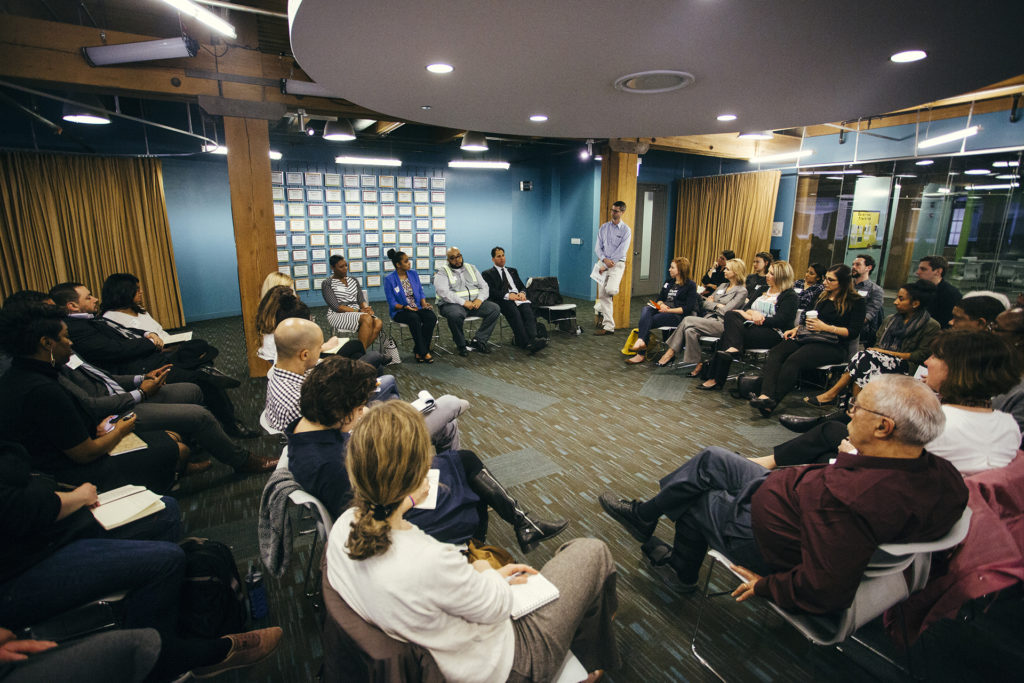
Finding Employment for Formerly Incarcerated Individuals Isn’t Easy, but Solutions Spring Eternal

On the morning of Tuesday, February 21, Chicago Ideas teamed up with Cara and I.C. Stars to host a roundtable discussion on hiring formerly incarcerated individuals. Moderated by WBEZ editor Rob Wildeboer, the conversation brought together Safer Foundation vice president of external relations Sodiqua Williams, Cara admissions specialist Raahsaan Brown, Midway Moving president and CEO Jerry Siegel and Cook County Department of Corrections executive director Nneka Jones Tapia.
Sanctions in many states prevent ex-offenders from being eligible for public housing, food stamps and student loans. But perhaps the most constrictive barrier for formerly incarcerated individuals reentering society is finding employment, despite studies that show the group tends to possess skills that are desirable and in demand. The discussion aimed to look into those barriers, and act as a place to make connections that help foster solutions to curb them.
The event accomplished just that, and so we’ve compiled a list of takeaways below. If you’re looking to keep this conversation going and learn how to take action when it comes to prison reform, be sure to attend Chicago Ideas’ Reimagining Prison event on Thursday, February 23.
Roughly 40 percent of Illinois’ adult population has an arrest or conviction record

In her role at Safer Foundation, Williams works with formerly incarcerated individuals, government bodies and employers to help break down obstacles that keep people with arrest and conviction records from obtaining employment. A big part of her work is to reduce the stigma placed on job seekers who have been previously incarcerated, and she posited one statistic that is pretty harrowing: more than 4 million adults in Illinois have arrest and/or conviction records. That accounts for more than 40 percent of the entire state’s adult population, which makes one wonder how employers and government agencies can discriminate against such a large portion of the population.
Almost half of the detainees at Cook County Jail do not have violent backgrounds

Tapia laid out a lot of the good work that she and Cook County Sheriff Tom Dart are doing on California Avenue, but also explained some of the challenges that come with running the largest single site jail in the country. She said that as of the roundtable, Cook County Jail was housing roughly 7,540 detainees—nearly half of whom are behind bars for nonviolent offenses. That comment led attendees to a simple conclusion: a key way to solve the issue of widespread unemployment among formerly incarcerated individual is to reform the justice system and put less resources against locking up nonviolent offenders in the first place.
“Taking a chance” on hiring a formerly incarcerated individual is hardly a risk

Siegel has been hiring people with arrest and conviction records at Midway Moving for more than two decades—the practice has been a key part of his business. By giving many of these people a chance at employment, he’s found that they excel at an equal or higher rate than employees with clean background checks. Deno Andrews, owner of Felony Franks in Oak Park, was in attendance and agreed. His hot dog stand exclusively employs individuals who have previously been incarcerated, and has become a local gem in the process.
“Our retention rate is high,” Andrews said. “When people do leave, they do so for high-paying jobs. One former employee left to work at a factory where he makes $50 per hour plus benefits.”





